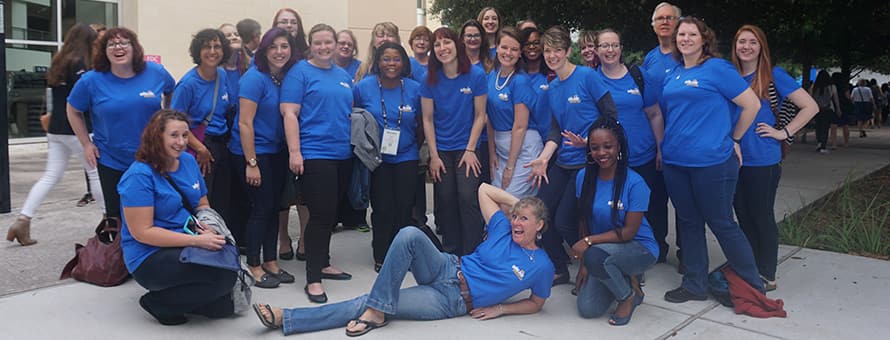Grace Hopper Scholarship Winner Attends Women in Computing Gathering

For Toni Harris, winning a scholarship to attend the Anita Borg Institute's Grace Hopper Celebration this month fits perfectly in what has been a life spent interested in computing and technology. She gets it from her dad.
Harris, who is studying for her master's in IT at Southern New Hampshire University, grew up going to Star Trek conventions with her father, Atonus Harris. She watched him build remote control airplanes and write software programs for companies like McDonnell Douglas, Texas Instruments and Raytheon. It engendered her own interest in techie hobbies that began with science-fiction books and comics , video games and "tinkering with robots." Now Harris is a business analyst at Raytheon, the company her father retired from, and one of the estimated 15,000 women who gathered at the Toyota Center in downtown Houston over three days in October to listen to experts in a range of technologies speak at sessions like, "Blockchain and the Internet of Things," "Cache Me If You Can" and "Shattering the Old Boys' Club: Redefining Mentorship for Young Women in Tech."
Anita Borg and Grace Hopper
Harris first became involved with the Anita Borg Institute in 2005 when she attended the Virtual Development Center for Women. Applying for a scholarship to have the chance to attend the Grace Hopper conference was an easy decision. "When I heard about the Grace Hopper scholarship I was excited to go to a conference where I could meet women from (the) industry and learn from them," Harris said.
The three-day conference was founded more than 20 years ago by Dr. Anita Borg and Telle Whitney in honor of U.S. Navy Admiral Grace Hopper. Hopper was a luminary in computing and technology through her work on the Navy's Mark I computer during World War II. Once while trying to fix the machine she discovered a moth inside interfering with some wiring. The term 'computer bug,' was coined. By the end of her long career, she was an in-demand speaker and thinker in the computing industry, according to the U.S. Navy. It is the largest conference for women in computing and brings together some of the best minds in the field to highlight new products, systems and ideas. It also serves as a networking, mentoring and collaboration opportunity for attendees, according to the Anita Borg Institute.
Women in Computing
Angela Foss, associate dean of STEM Programs at SNHU, has known Harris since they were freshmen engineering students. She said Harris is the "perfect" person to receive the Grace Hopper scholarship. "We need more diversity but she's been doing it all along," Foss said. "She's just always been supportive of an inclusive and diverse workplace. She's always been doing these things to try to promote STEM and technology."
Harris said while her experience working at Raytheon in a male-dominated industry has been a good one, there have been times previously in her career that she has struggled to be heard. But "I am a bit of an extrovert so people usually work well with me once they get to know me." Foss said it's more than being an extrovert or assertive. She said she's long admired her friend for her willingness to speak out and stand up for herself. "When it comes to women in tech, without even knowing it she's doing some of that work. She just naturally is inclined to do that - being supportive of women in the organization," Foss said. "She's super tough. She's not afraid to stand up. She's just not. In terms of her ability to speak up, she has no problem."
Increasing the number of women in computing industries is important for many reasons. One of those reasons is that better solutions are found when women are part of the team. Foss said research has found that engineering teams that include women are more successful.
The National Center for Women and Information Technology (NCWIT) makes the same point. It's "Women in Tech: The Facts" report cited one study of 100 engineering teams at 21 companies that found that teams with roughly equal numbers of men and women were more likely to "experiment, be creative, share knowledge and fulfill tasks" than other teams. But the NCWIT found that the number of women and minorities in tech is trending in the wrong direction. In 2014, women made up 26% of computing occupations, a 10% drop from 1991. For women of color though that number is just 3%. Male-only invention teams account for 88% of all IT patents, according to the report.
There is also a growing number of products and services that have technical elements and not enough technicians to solve the problems that presents. "You can't fill that need with just the men," Foss said. "Our job outlook is highly technical. There's just so much that needs to be technically addressed. You're just not going to meet that need if you don't add women to the mix. Just sheer volume. You just don't have enough qualified candidates in the current state unless you have women in the mix."
Women in Computing Come Together
In 2015, the Grace Hopper conference was attended by almost 12,000 from 63 countries and more than 1,300 companies, according to the Anita Borg Institute, a 50% lift from the previous year. Expected attendance this year is 15,000.
Harris said the chance to attend the conference is exciting because she's interested in improving not only her skills as a business analyst and data scientist but also in robotics and sensors. It's also a good opportunity to talk with her peers in different sectors of the industry. "I want to attend a conference for women because I want to celebrate technology with women my own age who share common interests with me," she said. "I also want to pick their brains about the millennium goals. Improving the lives of women and girls is important to me."
Harris had some advice for other women interested in a technology-focused career. She said reading a lot, taking free online classes via EdX and other sources was helpful for her. She also recommended joining groups like robotics clubs and going to hack-a-thon events. "Now more than ever you can access knowledge from all over the world ... ," she said. "Build a circle of friends that can help you both professionally and personally."
"My best advice is just keep swinging. It's kind of like softball. Each time you step up to (the) plate and give your all, you get better and over the years you become a pro," Harris said. "No one starts out great. You will fail. You will fall down. You might even get heckled ... but all you can do is just keep swinging in spite of the naysayers.
Explore more content like this article

How to Get Into AI: What AI at Work Looks Like for Beginners

Understanding AI Ethics: Issues, Principles and Practices

What is the Best Degree for an Artificial Intelligence Career?
About Southern New Hampshire University

SNHU is a nonprofit, accredited university with a mission to make high-quality education more accessible and affordable for everyone.
Founded in 1932, and online since 1995, we’ve helped countless students reach their goals with flexible, career-focused programs. Our 300-acre campus in Manchester, NH is home to over 3,000 students, and we serve over 135,000 students online. Visit our about SNHU page to learn more about our mission, accreditations, leadership team, national recognitions and awards.


